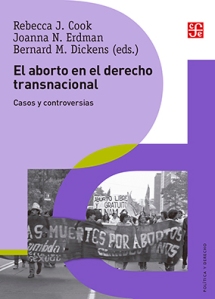Many thanks to Verónica Undurraga and Michelle Sadler, professors of law and medical anthropology (respectively) at the Universidad Adolfo Ibáñez in Santiago, Chile, whose comments on the recent Chilean Constitutional Court decision have been published in Sexual and Reproductive Health Matters:
“The misrepresentation of conscientious objection as a new strategy of resistance to abortion decriminalisation,” by Verónica Undurraga and Michelle Sadler, Sexual and Reproductive Health Matters 27.2 (2019):17–19. Article online.
On January 18, 2019, the Chilean Constitutional Court forced the expansion of conscientious objection rights into the newly enacted law that decriminalizes abortion under three grounds.[1] The original bill, passed by the legislature in 2017 had restricted the right to health professionals; the Constitutional Court upheld that bill, but added institutions and non-professional staff working in the surgical ward as holders of the right to object.[2] The Court grounded institutional conscientious objection not only on the freedom of conscience clause of the Constitution, but also on the freedom granted to educational institutions, the freedom of association, and the protection of “intermediate groups” (any formal or informal association between the individual and the State).
The protection of intermediate groups, together with the doctrine of the subsidiary state, must be understood in the context of a Constitution that was enacted under the Chilean dictatorship, reacting to what it understood as the threat of a Marxist totalitarian state. The neoliberal economic logic inherited from that military era now influences the provision of health care in Chile. Guided by this logic, still embedded in the Constitution, the Court argued that private providers of gyneco-obstetric services are not obliged to provide abortion in the first place, and therefore it declared unconstitutional a prohibition of invoking conscientious objection that the Ministry of Health had imposed on private health institutions that hold agreements with the State to provide gyneco-obstetric services. Thus, the Court argued that the right to conscientious objection is applicable to private institutions holding State contracts, those being the only ones that cannot refuse to provide the service without special legal permission.
Moreover, some voices in the medical profession are altering the nature of conscientious objection by conflating the personal moral nature of conscience with technical and ethical standards of the profession, arguing that abortion is a clinically inappropriate or non-beneficial treatment for patients, and claiming that doctors neither need to perform abortions nor refer the patient to a willing provider.
It is too early to evaluate the impact of the Court’s decision on the provision of abortion by private institutions, or whether erroneous understandings of conscientious objection will expand among practitioners. Therefore, women’s rights advocates are monitoring the situation (despite barriers to information), and educating health care providers on the legal duties of objectors to ensure women’s timely access to the procedure.
[1] Tribunal Constitucional [Constitutional Court, 2019, STC Rol N° 5572-18-CDS / 5650-18-CDS (acumuladas). 2019 Decision in Spanish. Backup copy. [expands conscientious objection to other institutions.]
[2] Tribunal Constitucional [Constitutional Court, 2017, STC Rol N° 3729(3751)-17 CPT. 2017 Decision in Spanish. Accompanying documents. Amicus Submissions. Síntesis en Espanol.
English translation of decision with Synthesis and Table of Contents for both English and Spanish editions. Synthesis in English. I-CONnect Symposium in English.
[3] Abortion Law Decisions webpage, based on the Table of Cases in Abortion Law in Transnational Perspective (University of Pennsylvania Press, 2014), is now updated with more than 145 court decisions, with links to full text where possible. English list. Spanish list.
______________________
Compiled by: the International Reproductive and Sexual Health Law Program, reprohealth*law at utoronto.ca. See Program website for our Publications, Information resources, and Reprohealthlaw Commentaries Series. TO JOIN THE REPROHEALTHLAW BLOG: enter your email address in the upper right corner of our blog, then check your email to confirm the subscription.




